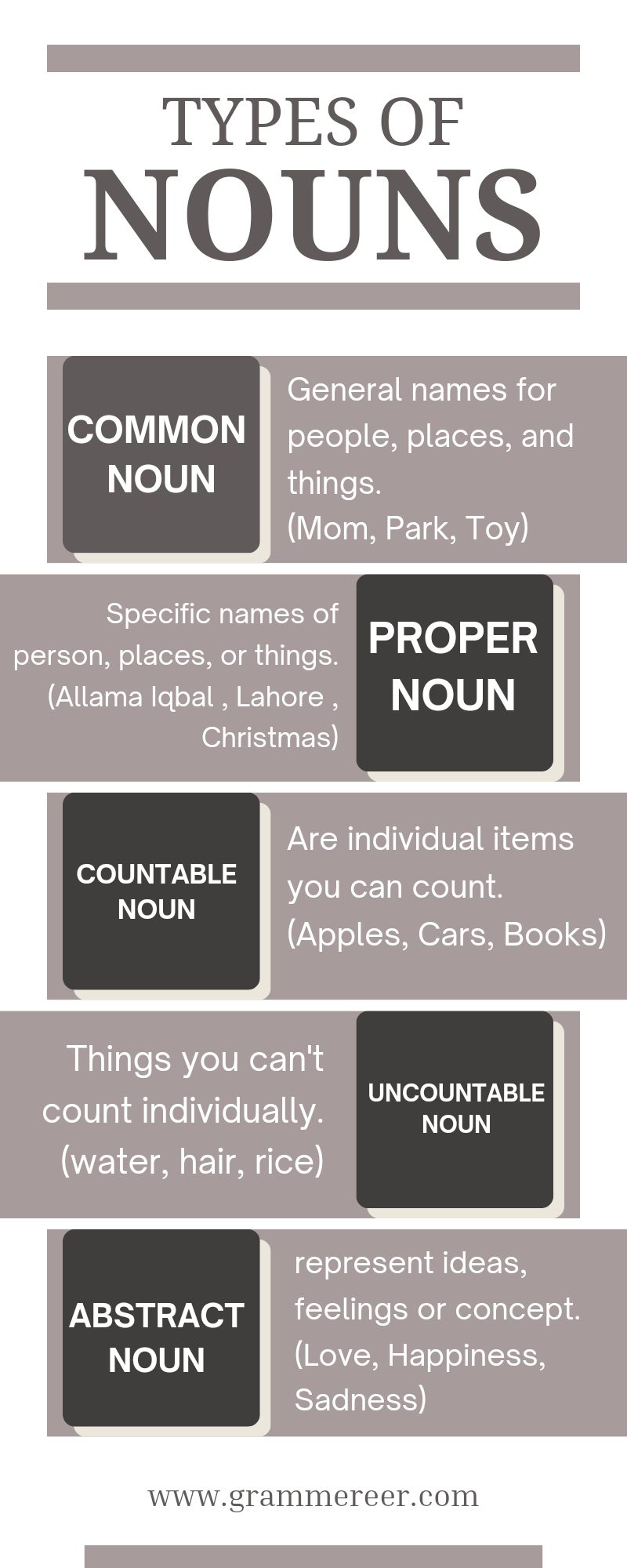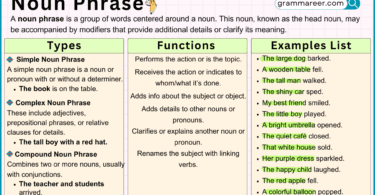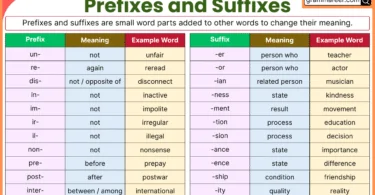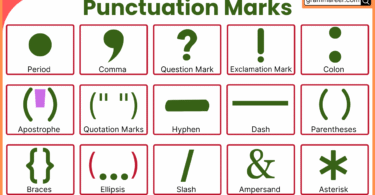English has many kinds of words called nouns. Knowing the types of nouns is helpful because each type has different rules. This knowledge is important for using nouns correctly in sentences.
Table of Contents
What are Nouns?
A noun is a word that names something, like a person, place, thing, or idea. In a sentence, nouns can do different jobs. They can be the main part (subject) or receive the action (object). They also describe or modify other words. For example, “Sana” is a noun (person), “park” is a noun (place), “book” is a noun (thing), and “freedom” is a noun (idea).
Persons: Teacher, Doctor, Artist, Student, Parent
Places: Park, Home, School, Office, Market
Things: Book, Car, Pen, Phone, Laptop
Ideas: Love, Joy, Hope, Freedom, Peace
TYPES OF NOUNS
Common Noun
Common nouns are words for ordinary things we see or use daily. They don’t point to a specific person, place, or thing. Instead, they refer to general items. Look around, and you’ll find common nouns everywhere!
Examples:
- dog (any dog)
- book (any book)
- teacher (any teacher)
- city (any city)
- flower (any flower)
Proper Noun
A proper noun is a special word used for the names of specific people, places, or things. It always starts with a capital letter. Proper nouns point to unique, individual things, making our sentences more precise and clear.
Examples:
- Lahore is a big city.
- Allama Iqbal is my friend.
- The Eiffel Tower is in Paris.
- Forest Park is a famous park.
- Wednesday is a day of the week.
Countable Noun
Countable nouns are things we can count, like toys. They have individual units. We use numbers with them, such as one toy or three apples. Countable nouns help us talk about things in a clear and specific way, using numbers to show how many of them there are.
Examples:
- I have two cats.
- She bought three apples.
- We need four chairs.
- He has five friends.
- They found six books.
Uncountable Noun
An uncountable noun is a word that represents something we cannot count separately. For example, we say “water” instead of “waters.” Advice: You give or receive “advice,” not “advices.” Furniture: It’s “furniture,” not “furnitures.”
Examples:
- Milk: “Milk” is uncountable; you can’t have “milks.”
- Money: We say “money,” not “moneys.”
- Happiness: It’s “happiness,” not “happinesses.”
- Time: You can’t say “two times,” just “time.”
- Information: “Information” is uncountable; you don’t say “informations.”
Compound Noun
A compound noun is when two or more words come together to make one new word. For example, think about “toothbrush.” “Tooth” and “brush” are two separate words, but when they join, they create a new thing—a tool to clean teeth.
Examples:
- Rainbow: “Rain” and “bow” combine to describe the beautiful colors after rain.
- School bus: “School” and “bus” make the vehicle that takes you to school.
- Chocolate cake: “Chocolate” and “cake” team up for a delicious dessert.
- Bedroom: “Bed” and “room” create a space for sleeping.
- Sunflower: “Sun” and “flower” a flower that loves the sun.
Collective Noun
A collective noun is like a group name for people, animals, or things. It’s a special word that represents a bunch of something together.
- Family: A family is a group of people who are related.
- Team: A team is a group of players working together.
- Herd: A herd is a bunch of animals, like cows or sheep.
- Flock: A flock is a group of birds flying together.
- Class: A class is a group of students in a school.
Abstract Noun
An abstract noun is a special kind of word that we use to talk about things we can’t see or touch, like feelings or ideas. For example, “love” is an abstract noun because you can’t hold it in your hand, but you can feel it.
Examples:
- Love
- Bravery
- Friendship
- Knowledge
- Kindness
Concrete Noun
A concrete noun is a word that you can see, touch, or feel. It’s something real and specific. Imagine holding it in your hands!
Examples:
- Table: You eat on a table.
- Ball: Something you can throw or kick.
- Book: Pages you read with stories.
- Chair: You sit on it for comfort.
- Shoes: Things you wear on your feet.
EXAMPLES SENTENCES
- My dog loves to play fetch.
- The sun shines brightly in the sky.
- I read a fascinating book yesterday.
- The family gathered for dinner.
- The teacher explained the lesson.
- Birds build nests in the trees.
- We bought fresh vegetables for salad.
- The baby giggled and clapped.
- The car parked in the driveway.
- My favorite color is blue.
- We visited the beautiful beach.
- The loud noise startled the cat.
- I wore my new shoes to the party.
- She drinks a glass of water every morning.
- We saw a rainbow after the rain.
Types of Nouns Exercise
Q1. What type of noun represents a specific person, place, or thing?
- a) Common Noun
- b) Proper Noun
- c) Abstract Noun
Q2. Which noun names a general person, place, or thing?
- a) Concrete Noun
- b) Abstract Noun
- c) Common Noun
Q3. What is a noun that can be touched, seen, or felt?
- a) Abstract Noun
- b) Collective Noun
- c) Concrete Noun
Q4. Which type of noun represents a feeling or concept?
- a) Collective Noun
- b) Abstract Noun
- c) Possessive Noun
Q5. Which noun represents a group of individuals or things?
- a) Abstract Noun
- b) Collective Noun
- c) Proper Noun
Q6. What type of noun cannot be counted?
- a) Countable Noun
- b) Uncountable Noun
- c) Concrete Noun
Q7. Which noun is a specific name for a person, place, or thing?
- a) Common Noun
- b) Proper Noun
- c) Possessive Noun
Q8. What is a teacher?
- a) Place
- b) Person
- c) Thing
Q9. Choose the place noun:
- a) School
- b) Joy
- c) Happiness
Q10. Identify the idea noun:
- a) Garden
- b) Freedom
- c) River
ANSWERS:
- Proper Noun
- Common Noun
- Concrete Noun
- Abstract Noun
- Collective Noun
- Uncountable Noun
- Proper Noun
- Person
- School
- Freedom
FAQs
Q1. What is a noun?
A noun is a word that names something – a person, place, thing, or idea.
Q2. Can you give examples of person nouns?
Certainly! Person nouns include names like Mary, jobs like “teacher,” and even characters like “Superman.”
Q3. What is the role of nouns in a sentence?
Nouns serve as the building blocks of sentences, working as subjects, objects, and more.
Q4. What are abstract nouns?
Abstract nouns represent ideas or feelings, such as love, freedom, and joy.
Q5. Can you explain possessive nouns with an example?
Certainly! A possessive noun shows ownership, like in “John’s car,” where “John” owns the car.
Q6. What are collective nouns?
Collective nouns refer to groups seen as one unit, like “family” or “team.”
Q7. Can you give examples of thing nouns?
Thing nouns include everyday objects like books, dogs, and cars.
YOU MAY ALSO LIKE






